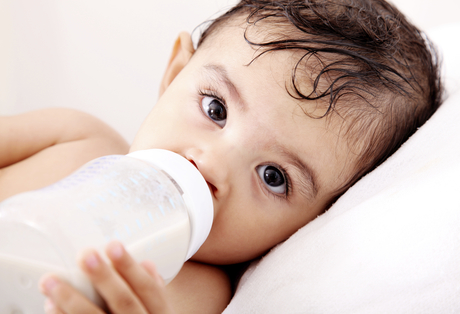How safe is our water? Water security in Australian infant formula production

Demand for internationally supplied infant formula in China has skyrocketed, but without GMP and clean water, Australia’s ability to deliver may be hampered.
Global demand for high-quality infant formula has been rapidly growing since 2008 when the Chinese infant formula contamination with melamine led to the deaths of six babies and put another 54,000 in hospital. In a bid to prevent a repeat disaster, the Chinese Government raised the quality standards, essentially locking the vast majority of Chinese companies out of the market.
As a result, demand for internationally supplied infant formula has skyrocketed.
New Zealand rapidly became the leading exporter of infant formula products into the Chinese $13.3 billion infant formula market. Australia is, however, steadily growing its output with numerous new facilities in the pipeline. Demand from China dwarfs local demand, with some 20 million Chinese born each year, compared to only 300,000 newborn Australians.
Australian and New Zealand supply can barely keep up, resulting in a ‘grey market’ where individuals sell infant formula they buy at the local supermarket online to China at a price roughly 5 to 6 times the local cost.
In order to take advantage of the high demand and margins for infant formula products, Australian dairy manufacturers are rushing to invest in new production facilities.
Murray Goulburn, which is Australia’s largest dairy business, recently announced it had signed two major contracts to sell its infant formula in both China and Indonesia. The company is planning to build a $300 million nutritional powder factory in western Victoria as a result.
This rush to build ‘white gold’ plants can, if we are not careful, lead to poorly thought out processes being placed into operation.
Product contamination as an inevitable consequence of poorly designed infant formula processes is a serious risk and could result in more health scares as well as considerable financial loss for our infant formula manufacturers. The Fonterra botulism scare in 2013 demonstrated that even false alarms can lead to severe economic consequences for the export market.
Water is one of the major sources of both inorganic, organic and microbiological contaminants for infant formula products. The risks are not new, with the leading Australian health, food, beverage and pharmaceutical manufacturers all having very strict processing and quality control requirements for any water used in their products. The quality standards for infant formula product quality are very strict and so the quality of the water used in those products and processes needs to be of very high purity.
Water treatment processes used to prevent contamination of infant formula products vary and are normally selected based on several factors including, but not limited to: the type of raw water used, the specific contamination risks of the source, the type of product manufactured (powdered or liquid) as well as the level of specific analytes desired in the final product. The water treatment process contains a number of steps, which may typically include flotation or clarification, conventional filtration, ultrafiltration, reverse osmosis, UV sterilisation, pasteurisation as well as product storage and distribution.
Although these treatment processes are very common, what is critically important for safe, high-quality infant formula production is that the design philosophy is sanitary. This philosophy comes from the need to eliminate spaces where microbes can nest in the system and multiply. The design must include the elimination of dead zones in the valving and piping system, leakproof design of interfaces between the CIP and process water circuits, high-velocity product water ring mains and steam/hot water and chemical sterilisation of the complete system.
The water treatment processes must also be designed for Australian conditions and Australian water sources. Receiving mains water and generating process water from original bore water sources is common practice in Australia. In infant formula production, this poses its own problems.
The highly saline nature of some bores need more complex desalination steps to meet the Australian Food Standards for Infant Formula Products with limits of 15 mg of sodium and 35 mg of chloride per 100 kJ of infant formula product. To meet this standard, infant formula process water typically requires total dissolved solids levels less than 10–15 mg/L. High iron, manganese, hardness and alkalinity levels in bores may need specific attention to prevent fouling of membrane systems.
Surface water supplies such as rivers, lakes or dams also face unique challenges. It is common for these sources to suffer from seasonal algal blooms, which must be pretreated by specialised flotation equipment to prevent biofilm formation or the generation of carcinogenic trihalomethanes from disinfection systems.
The presence of nitrates is also common, particularly in water sources located near farming areas. Nitrogenous compounds are poorly removed by membrane desalination processes and can result in ‘blue baby’ disease when present in even low concentrations within the final product.
Tailored, hygienically designed infant formula water treatment systems must be used to ensure a much greater level of safety when compared with generic non-hygienic process water systems.
Australia is entering a so-called ‘age of opportunity’. The food sector is one area that poses a very real potential to drive Australia forward into the ‘Asian Century’.
Our image as a nation producing high-quality raw and manufactured food products will help our economy to grow. Infant formula is one area where Australia can grow into a global market leader. However, we must all be diligent and ensure the quality of this valuable product and the safety of our consumers, who are our most precious commodity — the future generations of humanity.
Premium snack maker meets growing demand
UK chip manufacturer Burts has greatly increased its production capacity, enabled by TNA's...
Heat exchangers expand ginger beer production
Bundaberg Brewed Drinks ensured the equipment in its new Master Brewery maintained product...
In-house ginger processing for beverage maker
A ginger beer manufacturer reduces its supply risk by investing in pack-house technology to...














